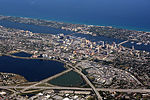Palm Beach County is a county located in the southeastern part of Florida and lies directly north of Broward County and Miami-Dade County. The county had a population of 1,492,191 as of the 2020 census, making it the third-most populous county in the state of Florida and the 26th-most populous county in the United States. The largest city and county seat is West Palm Beach. Named after one of its oldest settlements, Palm Beach, the county was established in 1909, after being split from Dade County. The county's modern-day boundaries were established in 1963.
Palm Beach County is one of the three counties that make up the Miami metropolitan area, also referred to as South Florida or the Tri-County area, which was home to an estimated 6,198,782 people in 2018.The area had been increasing in population since the late 19th century, with the incorporation of West Palm Beach in 1894 and after Henry Flagler extended the Florida East Coast Railway and built the Royal Poinciana Hotel, The Breakers, and Whitehall. In 1928, the Okeechobee hurricane struck Palm Beach County and caused thousands of deaths. More recently, the county acquired national attention during the 2000 presidential election, when a controversial recount occurred.
As of 2004, Palm Beach County is Florida's wealthiest county, with a per capita personal income of $44,518. It leads the state in agricultural productivity; agriculture is Palm Beach County's second-largest industry, after real estate development. In undeveloped (central and western) Palm Beach County there is significant tropical agricultural production, especially nurseries, truck crops (vegetables), and sugar cane. Palm Beach County has been called the "Winter Vegetable Capital" of the nation.









